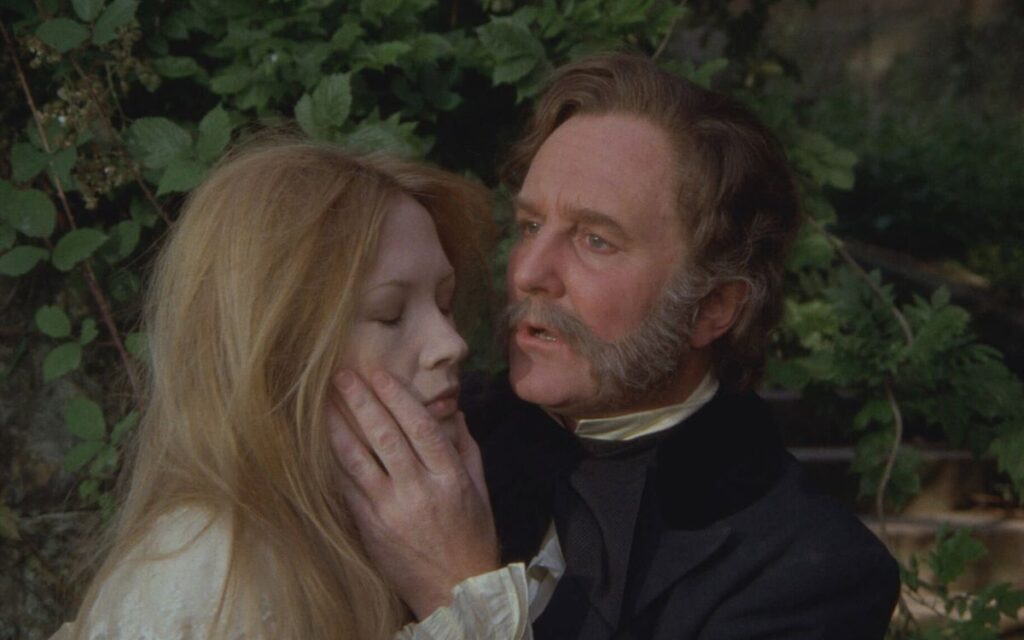Demons of the Mind 1972 was a a genre-defying misstep for Hammer, but remains a curiosity worth watching, says RICHARD MARKWORTH

TITLE: Demons of the Mind 1972
RELEASED: 5 November 1972
DIRECTOR: Peter Sykes
CAST: Shane Briant, Paul Jones, Patrick Magee, Yvonne Mitchell, Robert Hardy, Michael Hordern, Kenneth J. Warren
Review of Demons of the Mind 1972
Demons of the Mind 1972 bears all the Gothic dressing of a traditional horror film. However, it is a unique entry in the Hammer canon and stands alone as something of an oddity.
The action commences with a coach, containing a beautiful but clearly distressed young woman, Elizabeth (Gillian Hills), speeding through a gloomy forest. So far, so familiar and at this early point in proceedings die-hard horror fans could be forgiven for automatically assuming Elizabeth to be an unfortunate victim being transported to Castle Dracula via the vampiric equivalent of Uber Eats.
However, the monsters here are not of the supernatural variety. Elizabeth is accompanied by her Aunt Hilda (Yvonne Mitchell) who appears more a jailor than a loving relative. Hilda forces her niece to imbibe a sedative and, as she slips into docility, we see via flashback how Elizabeth had recently escaped her Aunt and thuggish coach driver Klaus (Kenneth J Warren) and subsequently spent a pleasant interlude with young medical student Carl (Paul Jones) whom she had stumbled across during her bid for freedom.
Unfortunately, Elizabeth’s happiness had proved temporary, and she had soon been tracked down by her pursuers who snatched her away from her new lover and the freedom he represented.
Hilda returns Elizabeth to her father, Baron Zorn (a scenery chomping Robert Hardy), who promptly locks her up. We learn Zorn keeps both Elizabeth and her brother Emil (Shane Briant) imprisoned in his sinister mansion while he desperately seeks to rid his offspring of the ancestral “evil” in their blood which he believes is responsible for an unnatural attraction felt between the two.
Emil and Elizabeth are “treated” by Heidi who administers bouts of bloodletting. This keeps them weak and listless, yet nonetheless determined to escape, while Zorn awaits the arrival of controversial psychologist, Falkenberg (Patrick Magee), whom he hopes will finally cure them.
Meanwhile, young girls from the nearby village are being murdered by a mysterious assailant much to the chagrin of their fellow peasants. A roaming priest (Michael Hordern), who appears to have wandered in from another film, rants continuously to anyone who will listen, and frequently to himself, claiming demons are responsible for the killings.
As Falkenberg and Carl travel to the area, the former to take up his position with Zorn and the latter in search of Elizabeth, the men discuss medicine. We learn Carl is no fan of Falkenberg’s discredited methods. Once he has visited Elizabeth and learns she is to be treated by the disreputable psychologist, the young man resolves to free her from the grasp of her family.
At the Baron’s residence, Falkenberg psychoanalyses Zorn who remains convinced there is an evil inherent in his family line. During this session it is revealed Zorn’s wife violently killed herself by slashing her own throat in front of their children. Later, once Falkenberg has analysed the siblings, the shady doctor concludes it was the trauma of witnessing the suicide that caused their incestuous feelings to manifest.
Falkenberg devises a questionable plan of therapy which involves dressing loose-living village girl Inge (Virginia Wetherell) in the siblings’ mother’s clothes and allowing her to interact with the mentally unstable Emil. Predictably, participation in this baffling course of treatment does not end well for Inge, and Falkenberg finally identifies the true instigator of both the siblings’ condition and Emil’s homicidal tendencies.
As Emil and Elizabeth attempt to flee the family home, a torch-bearing mob led by the priest, comes to realise the “demon” stalking the area is only too human and marches on the Zorn estate to exact bloody revenge for their murdered daughters.
There is undoubtably a good film hidden within Demons of the Mind. Unfortunately, the execution frustratingly fails to bring it fully to the surface.
Visually, the production is highly appealing but Peter Sykes‘ cluttered direction, a raft of poor dialogue and some over-theatrical performances all serve to hamper the storytelling. The last point is particularly infuriating as this contains arguably one of the better casts assembled for Hammer’s later offerings despite stalwarts, Peter Cushing and Christopher Lee, being notably absent.
Hardy delivers an over the top performance far removed from the expertly understated study in mounting dread he provided for the BBC’s The Stalls of Barchester broadcast the previous year. Whilst undeniably entertaining, this approach dilutes any belief the audience may have in his portrayal of the tortured Baron. The same can be said of Hordern who’s manic priest verges on caricature.
The remaining principal players perform solidly enough with Briant essaying the psychotic man-child persona he would revisit in Straight On Till Morning 1972, Magee suitably sinister as the dubious doctor and Hills managing to imbue Elizabeth with an air of innocence despite the character’s forbidden feelings for Emil and sexual relationship with Carl.
Unfortunately, what could have been an interesting study on the themes of conflicting belief in science and religion, the effects of childhood trauma and the psychological links between sex and violence becomes confused due to the inclusion of too many disparate elements which are not dealt with succinctly enough.
A plethora of blood and nudity is thrown into the mix, along with dashes of folk horror, murder mystery and psychobabble. The resulting film has a muddled feel and would surely have benefitted from a tighter script and a more ruthless edit.
Demons of the Mind 1972 is a brave attempt at subverting the established tropes of the genre, replacing the fantastical monsters of classic horror with those who prowl the human subconscious, and remains a fascinating curio for Hammer enthusiasts. Ultimately however, it proves something of a misstep by the famous studio.
Tell us your views of Demons of the Mind 1972 in the comments section below!







